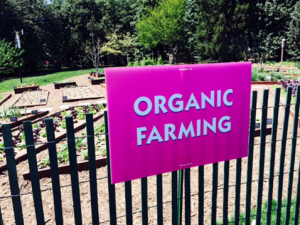I’m on the visionary panel. To register, click here.

It’s been a busy couple of weeks on the organic front.
To put the events in context:Organics cost more.
I think this photo comes from Jerry Hagstrom who must have seen it on the day of the annual Easter egg roll.

Sam Kass denies that the White House garden is organic. He told Hagstrom that “the sign was part of the Easter Egg Roll, not part of the kitchen garden…The planners of the Easter Egg Roll put up the sign…and he did not see it until he went down to the South Lawn during the event.” The garden uses “organic practices.”
A report from something called Academic Reviews draws a conspiracy-theory picture of organic farmers:
Our review of the top 50 organic food marketers….reveals that anti-GMO and anti-pesticide advocacy groups promoting organic alternatives have combined annual budgets exceeding $2.5 billion annually and that organic industry funders are found among the major donors to these groups…These findings suggest a widespread organic and natural products industry pattern of research-informed and intentionally-deceptive marketing and advocacy related practices that have generated hundreds of billions in revenues.
Finally, the findings strongly suggest that this multi-decade public disinformation campaign has been conducted with the implied use and approval of the U.S. government endorsed USDA Organic Seal in direct contradiction to U.S. government stated policy for use of said seal….As a result, the American taxpayer funded national organic program is playing an ongoing role in misleading consumers into spending billions of dollars in organic purchasing decisions based on false and misleading health, safety and quality claims.
Michele Simon points out that the report is the work of the two founders of the publication, which is supported by an impressive list of food and biotechnology industry supporters.
The authors make no statement about conflicts-of-interest.
Consumer Reports has a new survey of the attitudes toward organics of 1,016 adults. The survey found:
The National Organic Standards Board (NOSB) is meeting in San Antonio this week. Advocates for maintaining the highest possible standards for organic production are worried about the NOSB’s notice last September to eliminate the rule that synthetic materials approved for the organic production be reviewed every five years (see Federal Register).
Advocates for Small Organics worry that the NOSB’s actions will damage the credibility of the USDA organic seal. Some members of Congress agree.
the Organic Consumers Association (OCA) and March Against Monsanto San Antonio (MAMSA) staged protested the sunset of the 5-year rule at the meeting.
OCA says the NOSB made the change
Here’s a photo of the protest. Things must have gotten hot and heavy. The political director of the Organic Consumers Association was arrested. The group issued this statement:
When the bureaucrats running the USDA National Organic Program (NOP) call in the police to remove the political director of the Organic Consumers Association for protesting an illegal policy change, and continue to ignore the expressed concerns, and block her from attending the public meeting today, it’s clear that we need a new balance of power between the organic community and the organic industry.
This is the price of success for organics. Everyone wants to cash in.
Addition: Ellen Fried reminds me of this terrific graphic of who owns what in organics.